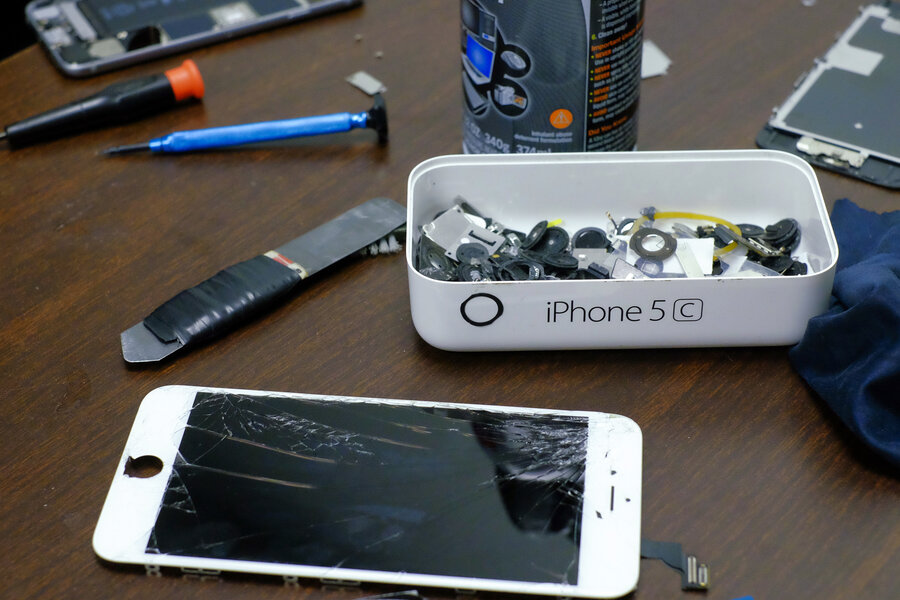Why Apple's pushback against the FBI isn't a technical issue
Loading...
At the core of the heated public debate over Apple’s refusal to help the FBI decrypt an iPhone belonging to one of the suspects in the recent terror attack in San Bernardino is one key question: whether the company can crack the phone's security without compromising the security of its encryption technology on a broad scale.
The answer, it turns out, in this particular case is a qualified ‘yes.'
Many cybersecurity experts say that older iPhones such as the one the FBI recovered from the San Bernardino terrorist attack – and wants Apple's help to unlock – are already hackable. And that software Apple is being asked to write for breaking into the phone recovered by the FBI would be unlikely to compromise the newer, more secure later models.
However, experts stress, just because Apple could hack these phones doesn't mean they should.
Apple CEO Tim Cook has claimed that if the company were to comply with Tuesday's order from a magistrate judge and somehow create software for unlocking the specific phone, it would be giving the government the potential to unlock any iPhone. In a passionate defense of Apple’s stance, Mr. Cook compared the software Apple would need to develop, to a master key “capable of opening hundreds of millions of locks – from restaurants and banks to stores and homes.”
The technical reality, say some security researchers, is somewhat more nuanced.
The iPhone that the FBI wants Apple’s help in decrypting is an iPhone 5C, a model released in 2013. The encryption on the phone is tied to the passcode that a user sets to lock and unlock the device. The phone has an auto-erase function that can be used to delete data after 10 failed attempts to log into the device using a passcode. The phone also features a passcode delay feature that forces the user to wait longer between guesses with every wrong guess.
What the FBI and the US District Court for the Central District of California want Apple to do is to write software that would essentially override these protections, and make it easier for authorities to run a program that could try potentially millions of combinations quickly to get into the phone by what's known as "brute force."
Based on Apple's own description of how its products work, the same software would not work on the company's newer iPhones, which ties the passcode that a user enters to a unique key stored in a separate hardware component on the device.
“Think of this like the 2-key system used to launch a nuclear weapon: the passcode alone gets you nowhere,” said Dan Guido, co-founder and CEO of security firm Trail of Bits, writing on the company’s blog. In order to decrypt contents on an iPhone featuring this technology, the FBI would need to have a way not just to crack the password but also to recover the second hardware key on the device, Mr. Guido said.
However, the software that Apple is being asked to develop would most likely work on an iPhone 5C of the kind that the government wants Apple’s help in breaking into. That’s because this model does not have the same level of protection against hacking that the newer models have.
“While the data is encrypted, the software controlling the phone is not,” said noted cryptographer Bruce Schneier in an opinion piece for The Washington Post. “This means that someone can create a hacked version of the software and install it on the phone without the consent of the phone’s owner and without knowing the encryption key," Mr. Schneier said, which is precisely what the government wants Apple to do.
Though there are some obstacles overcome, Guido agrees it is technically possible for Apple to comply with the court’s order to unlock the iPhone 5C – and to prevent the FBI from exploiting the software later by locking the software so it works only on the phone from the investigation, and to perform all data recovery on its own.
But just because it's technically possible, the experts say, does not necessarily mean helping the feds crack the phone is the right decision for Apple.
The court wants Apple to load the new software on the recovered device at a government facility – or provide the government with remote access to the device so it can decrypt the device.
Either approach would amount to the government gaining access to a piece of software that at the very least would give it a way to unlock encrypted data on iPhone models similar to the one at the center of the case. "Make no mistake; this is what a backdoor looks like," Mr. Schneier noted.
And that, as Apple has made clear, is something that it is not willing to enable, at least without fighting it out in court. "The government could extend this breach of privacy and demand that Apple build surveillance software to intercept your messages, access your health records or financial data, track your location, or even access your phone’s microphone or camera without your knowledge," Cook said.
"We feel we must speak up in the face of what we see as an overreach by the US government."








